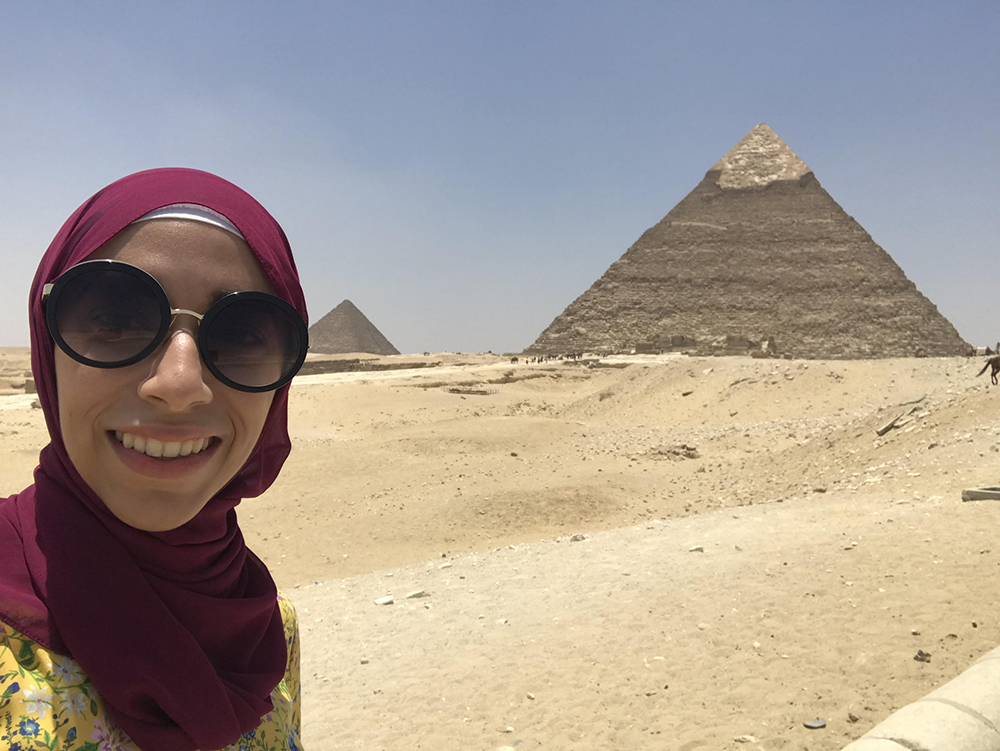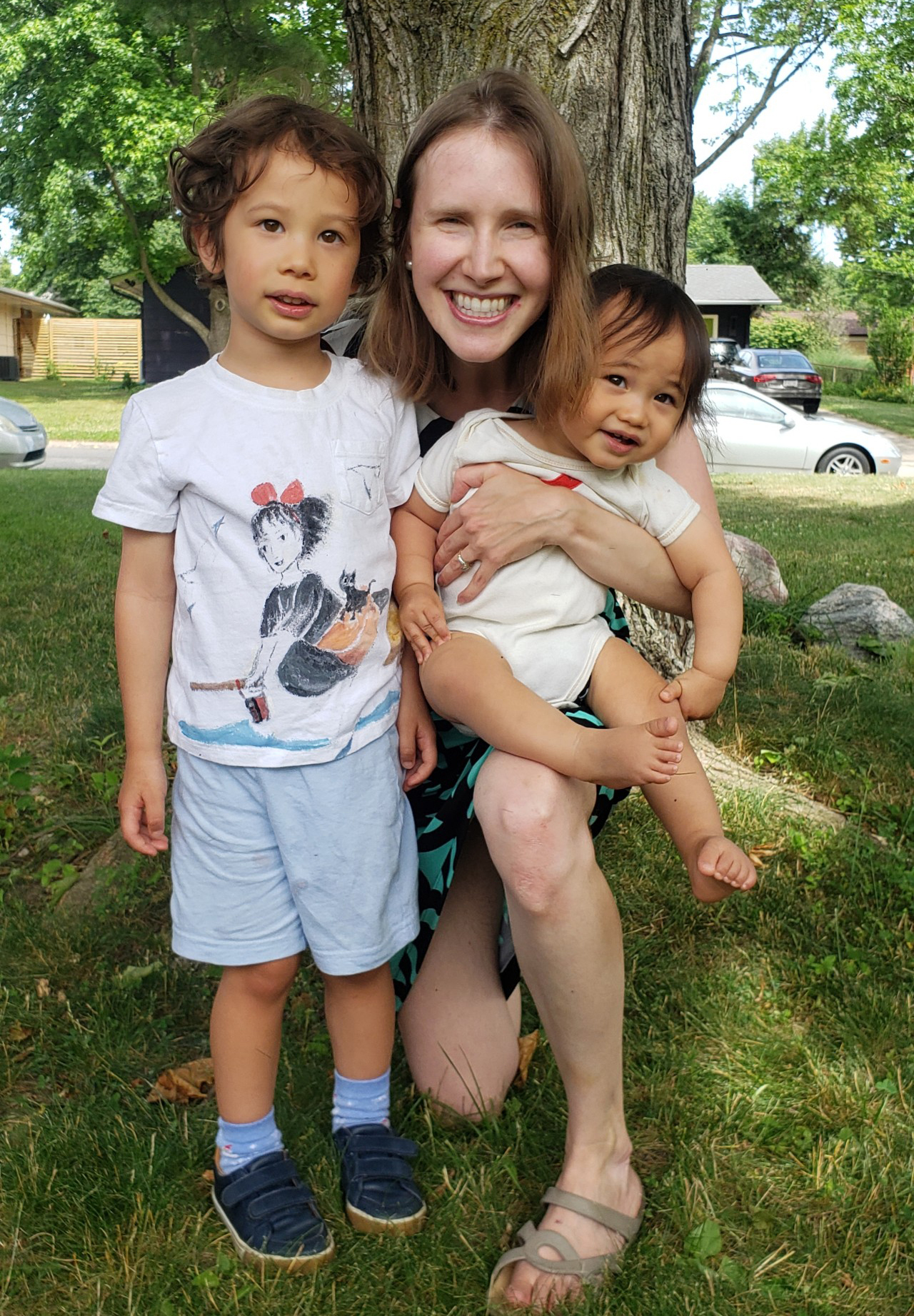ADDING
PERSPECTIVE
Noha Abdelghany and Theresa Anderson are carving personalized paths in the field of mathematics. For Abdelghany, being an educator is a family tradition. For Anderson, her unconventional approach to math inspires her students.

Noha Abdelghany
Assistant Teaching Professor, Mathematical Sciences
Noha Abdelghany comes from a family of teachers. Her mother is a teacher. Her three older sisters went to college to be teachers. As the middle sister (she also has three younger sisters), Abdelghany was determined to do something different. She decided to pursue a degree in computer science, but she took a class her first year that changed everything. The class was a mix of mathematical logic and set theory.
“I just fell in love with it,” she said. “It was the best class that I had ever taken at that time. I would do my computer science homework really quickly and get back to the math.”
Even though math sparked something inside of her, she didn’t really consider pursuing a degree in mathematics.
“I was a little resistant because I didn’t want to be a teacher. And that was the only thing that came to mind. If I’m going to major in math, my only career option is to be a teacher,” said Abdelghany, an assistant teaching professor in the Mellon College of Science’s Department of Mathematical Sciences.
By the end of her sophomore year, Abdelghany realized that math was her passion, so she switched majors and never regretted her decision. She earned her bachelor’s of science in mathematics from Cairo University and her Ph.D. at Western Michigan University. Her research interests are in algebraic coding theory, the math that’s behind-the-scenes of many areas of communications, including television, email and text messaging. In her research, Abdelghany works to design error-correcting codes that can reliably transmit information across noisy channels.
Abdelghany loves doing research — but here’s the ironic part — she ended up loving teaching more than anything.
“I loved teaching and interacting with students. I just never thought that this is what I wanted to do. And I never would have found out without pursuing a major in math and doing what I liked.”
Seeing students actually getting it, seeing that light bulb go on, is rewarding for Abdelghany. She also sees the value in being herself — a female mathematician — and how important it is for students to see relatable role models. As a visiting assistant professor at Colby College, Abdelghany interacted with a lot of minority math students — international students, non-native speakers, women.
“They would come to me and say, ‘I loved it when I saw you in the classroom. It was really nice to see someone who is not the standard older white male. Seeing you, I feel like I can achieve something,’” she said.
Abdelghany is thrilled to be at Carnegie Mellon University, which she first heard about as a computer science student at Cairo University.
“I thought it was a perfect fit for me,” she said. “Because teaching is my number one focus, I appreciate how the department has a separate track for teaching professors. It lets people focus on teaching and give it everything they have.” She also plans to continue her research and looks forward to interacting with students in a research capacity.
For someone who did not want to be a teacher, Abdelghany has found her calling, and she doesn’t hesitate to pass along her wisdom to her students.
“The problem-solving skills and critical-thinking skills you learn from majoring in math put you on the path to do anything you set your mind to,” she said.

Theresa Anderson
Assistant Professor, Mathematical Sciences
Theresa Anderson never set out to be a mathematician. She was creative — she liked the arts and languages — and math just seemed too rigid. But then, she took her first college-level math course. It was a proof-based course, and she got a taste of how much creativity was involved in coming up with mathematical discoveries.
“It was just so liberating, seeing the creative aspect of math and seeing that yes, the way I think has a place here,” said Anderson, an assistant professor in the Mellon College of Science’s Department of Mathematical Sciences.
Sixteen years after that inspiring math class, Anderson still gravitates toward math problems that are not so rigid, ones that she can approach from a variety of perspectives. Her area of expertise is in both harmonic analysis and number theory, two fields that may seem like a non-traditional pairing, but make perfect sense to Anderson.
“I tend to connect areas of mathematics and build bridges and not constrain myself. I pull techniques from a variety of fields and go out of my comfort zone to explore new things,” said Anderson, who earned a master’s degree and Ph.D. in mathematics from Brown University and completed a National Science Foundation Mathematical Sciences Postdoctoral Research Fellowship at the University of Wisconsin-Madison.
Along the way, she’s discovered that her unconventional way of approaching mathematical problems is inspiring to students, including the fact that she herself — a woman doing math — is still somewhat unconventional. In Anderson’s experience, just being that face on the web page is huge.
“People see that, and it’s very powerful. Oh look, it’s a woman. Students will just come and talk to me, and those talks oftentimes lead to mentoring relationships,” Anderson said.
Anderson plans to continue fostering those types of relationships in her role at Carnegie Mellon University, especially when it comes to supporting minority students interested in math. She was drawn to CMU’s vibrant and diverse community, and she has a few ideas already on ways to help the Department of Mathematical Sciences realize its aim of becoming more inclusive. Her ideas stem from being a woman in a male-dominated field and from her experiences as a white member of a minority community.
Anderson’s family is not white. She’s seen with her own family and the community she has become a part of how subtle things can make people feel welcome or unwelcome.
“I think for people who don’t have that perspective, they just have no idea. That’s one of the things I want to try to help with — getting the next generation more involved and more aware of how small things can actually have big impacts on minority communities,” she said.
Anderson is working with Michael Young, associate dean for Diversity, Equity and Inclusion in the Mellon College of Science, to develop a class for graduate students that will raise awareness of the barriers minorities have faced in the mathematical sciences. One focus of the class will be reading and discussing experiences of Black mathematicians.
“One of the big things is just reading these stories and raising awareness. It’s giving that perspective,” Anderson said. “That’s what I have in mind throughout my teaching, whether it be a math course or a social justice course: to open a student’s mind to not just fill it with information but also to open it to different perspectives.” ■
■ Amy Laird